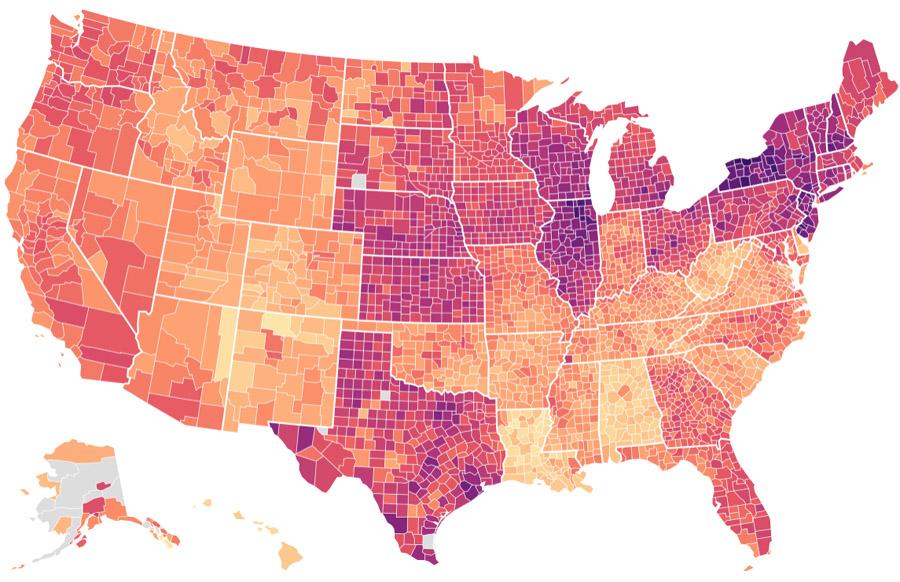
Where are the lowest property taxes in the US? The highest property taxes?
Some states offer no surprises. New Jersey, for example, charges the highest property taxes in the nation as a statewide average. But Texas also ranks among the top five highest property taxes in the US, despite a small-government and low-tax political culture.
Note that property taxes are generally charged at the local level, not the statewide level. So while it’s still a fun exercise to compare property taxes by state, it’s even more useful to compare property taxes by county.
Which is precisely why we created two interactive maps displaying both property taxes by state and property taxes by county.
It’s also worth mentioning that property taxes make up only one form of taxation. To get a sense of the total tax burden of any given area, you have to also include income taxes, sales taxes, and excise taxes.
Read on for a complete look at the states with the lowest property taxes — and how property taxes fit into each state’s total tax burden.
Property Taxes by State (Interactive Map)
The average property tax rate varies greatly from state to state. Using data from the National Association of Home Builders, we compiled an interactive map to compare property tax rates by state:
Would your readers enjoy this interactive map of the states with the lowest property taxes? Click here for the embed code.
Share This Map on Your Site
But don’t mistake the tax rate for the total property taxes collected for the average homeowner or landlord. The property values in some states are much higher than others, which impacts the total property taxes paid by owners. Here’s how the map looks when we rank states by the total amount of property taxes collected from the median property owner:
Would your readers enjoy this interactive map comparing property taxes by state? Click here for the embed code.
Share This Map on Your Site
Remember, these only represent statewide averages. To better compare property taxes, you have to drill down to the county level, where property taxes are actually collected.
Property Taxes by County (Interactive Map)
Property taxes are generally set and collected at the local level, so, even within the same state, property taxes can differ by a wide margin. Take a look for yourself:
Would your readers enjoy this interactive map comparing property taxes by county? Click here for the embed code.
Share This Map on Your Site
Take Arizona, for instance. Apache County collects only 0.18% of each property’s value each year in property taxes, while Pima County charges more than five times that tax rate at 0.96% of the property value.
In Virginia, Loudoun County hits homeowners and landlords with a tax rate of 1.093%, while Buchanan County charges a third of rate (0.353%).
Often cities charge higher property taxes than suburban or rural counties. My home city of Baltimore, for example, charges roughly double the property tax rate that the surrounding county charges. While far from the only force driving Americans away from the largest cities, it certainly doesn’t encourage residents to stick around.
Still, you can see clear patterns within states. Check out how much darker all Texas counties are than neighboring Louisiana counties. But do states with low property tax rates always make cheap property tax states in terms of total dollars collected from each homeowner or landlord?
Lowest Property Taxes in the US
Perhaps surprisingly, Hawaii charges the cheapest property taxes in the US, at least by tax rate. Of course, they also feature some of the highest property values in the country, so a low tax rate still yields a hefty total sum. The ten states with the lowest property taxes in the US (by rate) are:
- Hawaii: 0.30%
- Alabama: 0.42%
- Louisiana: 0.50%
- West Virginia: 0.53%
- Delaware: 0.55%
- South Carolina: 0.56%
- Wyoming: 0.57%
- Colorado: 0.63%
- Arkansas: 0.64%
- Mississippi: 0.65%
If you want to include Washington DC, it would have landed in the #8 slot with property taxes charged at 0.58% of property value.
But the list looks different when you order it by the lowest total property taxes collected for the median property owner:
- Alabama: $658
- West Virginia: $685
- Louisiana: $832
- Mississippi: $861
- Arkansas: $890
- South Carolina: $1,036
- Kentucky: $1,215
- Oklahoma: $1,253
- New Mexico: $1,320
- Wyoming: $1,349
Many of these states with the lowest property taxes overlap. Alabama, West Virginia, Louisiana, Arkansas, South Carolina, Wyoming, and Mississippi all rank among the states with the lowest property taxes regardless of whether you rank by tax rate or total property taxes collected for the average property.
But some states fall at the opposite end of the spectrum when you look at the total average property taxes collected.
Highest Property Taxes in the US
Which states charge the highest property taxes in the country?
The ten states with the highest property taxes in the US (by rate) are:
- Connecticut: 1.56%
- Ohio: 1.60%
- Michigan: 1.61%
- Vermont: 1.67%
- Nebraska: 1.75%
- Texas: 1.77%
- Wisconsin: 1.80%
- New Hampshire: 1.97%
- Illinois: 2.00%
- New Jersey: 2.10%
Of the five states that charge the highest average property tax rates, two of them charge no income tax: New Hampshire and Texas. More on how property taxes fit in the larger state tax burden momentarily.
Again, percentage and dollar amount vary with the actual real estate prices in each market. By dollar amount, the ten highest property tax states read as follows:
- Maryland: $3,533
- California: $3,846
- Vermont: $4,111
- Rhode Island: $4,319
- Massachusetts: $4,442
- Illinois: $4,561
- New Hampshire: $5,186
- New York: $5,463
- Connecticut: $5,869
- New Jersey: $7,800
The state with the highest property tax, New Jersey, charges more than double the average property taxes collected by the tenth most expensive state for property taxes, Maryland. It’s probably not the only reason residents are moving out of New Jersey, but it certainly doesn’t encourage them to stay.
(article continues below)
Total State Tax Burden
State and local governments charge a range of tax types, including income taxes, sales and excise taxes, and, of course, property taxes. (For reference, excise taxes apply to specific goods and services, such as gasoline or cigarettes). In order to accurately compare taxes by state — apples to apples — you have to combine these different tax types to calculate the total tax burden in each state.
Which our friends over at WalletHub did, for a fascinating analysis:
As you can see, some states charge no income tax, but high property taxes (e.g. Texas and New Hampshire), while other states charge high sales and excise taxes, but low property taxes and income taxes, such as Alabama.
If you plan to invest in rental properties in a state where you don’t live, then sales, excise, and income taxes don’t apply to you. For real estate investors, only property taxes directly impact their returns, as they forecast a property’s cash flow with a rental income calculator.
Even so, high state taxes can still indirectly affect your return on investment as a real estate investor. The migration pattern within the US over the last five years has generally seen Americans leaving high-tax states in favor of states with a lower total tax burden.
Here’s the latest migration data from United Van Lines, showcasing the top ten inbound and outbound migration states:
There’s not a perfect 1:1 correlation between migration and tax rates, of course. People are piling into Vermont, for example, despite the high taxes and cold winters. But if you compare the average tax burden ranking between the top ten outbound states compared to the top ten inbound states, the outbound states charge significantly higher taxes.
Final Thoughts
The average homeowner in Alabama pays $658 per year in property taxes. In New Jersey, the average homeowner pays more than ten times that, blowing $7,800 per year in property taxes alone.
With an incoming president who plans to raise federal taxes, Americans may find themselves less inclined than ever to pay high property taxes. Sure, they’re tax deductible for landlords, but they can still eat into your real estate cash flow.
As a real estate investor, look for ways to minimize your tax burden, both personally and among your rental properties. From reducing your real estate capital gains tax to moving to a state with lower property taxes, find ways to keep more of your earnings in your pocket if you want to reach financial independence at a young age!♦
Are you considering moving to a cheap property tax state? Why or why not?
More Real Estate Investing Reads:
About the Author

G. Brian Davis is a landlord, real estate investor, and co-founder of SparkRental. His mission: to help 5,000 people reach financial independence by replacing their 9-5 jobs with rental income. If you want to be one of them, join Brian, Deni, and guest Scott Hoefler for a free masterclass on how Scott ditched his day job in under five years.



























Nice to be in the 5th lowest property taxed state! My home bears that out, 3,000 sq ft, four bedroom, four full bathrooms on two acres would sell for under $200K. Property taxes less than $100 a month. Insurance very low too. HOA’s don’t exist here either.
Glad to hear that Steve! Yeah Deni was telling me a few minutes ago about a house her daughter was looking at in New Jersey, very average house. Had a $9,000/year property tax bill! Talk about a turnoff…
Me, as a real state investor for like 20 years now, cannot thank you enough. This is an awesome blog post! Do you guys have a Online Course, right? Did you talk about taxes on the classes as well?
We do have several online courses C.! We talk some about tax strategies, but this is the deepest we dive into property taxes by state and county.
This is such a great resource for investors. Great job! I have yet to find an article with this level of detail by county, etc. Top notch!
Thanks Tanya, much appreciated!
Thanks Brian. Very helpful article.
One additional point to consider could be income taxes for the out-of-state (or out-of-country) landlord. If a state has high income taxes, and a rental property in that state is highly profitable (even after depreciation, etc), then the landlord can still be hit by a significant tax bill on the rental income sourced from the state. Typically not nearly as impactful as property taxes, but still a consideration. Would be interesting to see the combined impact for a hypothetical average rental.
Great point CV! Many states do hit out-of-state landlords with income taxes, both for ongoing rents and when they go to sell the property. Investors beware!